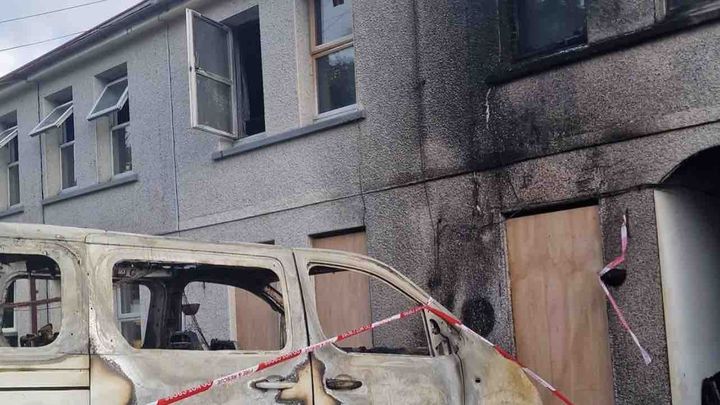Cornwall EV Blaze - Speaking to the owners of the Vauxhall Vivaro after the fire
- Thread starter Raboa
- Start date

Help Hensbys After Losing Everything In House Fire, organized by Jenna McEleavey
Hi everyone, I’ve started this page to help raise as much as we pos… Jenna McEleavey needs your support for Help Hensbys After Losing Everything In House Fire
www.gofundme.com
Oh dear, this idiot again with his campaign against electric cars, this time trying to turn it against using them for motability.
Strange that he and his ilk were always so silent when it was frequent fires in i.c. cars and vans. For example, also with Vauxhall in this link:
Yet another Vauxhall Zafira recall over fire risk
I'm sure many of us well remember how often the petrol and diesel Zafira's went up in flames in the 15 years from 2005 to 2019.
.
Strange that he and his ilk were always so silent when it was frequent fires in i.c. cars and vans. For example, also with Vauxhall in this link:
Yet another Vauxhall Zafira recall over fire risk
I'm sure many of us well remember how often the petrol and diesel Zafira's went up in flames in the 15 years from 2005 to 2019.
.
Indeed so, I do recall that saga, I had a close relation that had a Zafira.I'm sure many of us well remember how often the petrol and diesel Zafira's went up in flames in the 15 years from 2005 to 2019.
There must these days be enough electric cars about to effectivly relate the number of fires, of stationary\parked vehicles, petrol\diesel versus electric ?
I would think so Stuart. There's now 1.4 million plug in e-cars registered in Great Britain, and since the great majority of all e-car fires related to the li-ion battery are in one make, Tesla, that should make it even simpler.Indeed so, I do recall that saga, I had a close relation that had a Zafira.
There must these days be enough electric cars about to effectivly relate the number of fires, of stationary\parked vehicles, petrol\diesel versus electric ?
For example, the largest selling in the world until just over a year ago was the one sold for the longest from 2010 to the present, the Nissan Leaf, and no Leaf worldwide has ever suffered a li-ion battery related fire. So that part of the maths is very easy!
One in the USA did ironically suffer a fire caused by the conventional 12 volt SLA battery circuit which all cars, including e-cars, have to run the usual car electrics, the LI-Ion batteries being only used for traction.
.
Last edited:
I can see that someone posting exposes about electric cars catching fire in peoples drives might be making money, but where are the informative real world statistics ?
Anyway, life risk wise I dont worry too much about the car parked outside my house.
What is of concern is what happens in a collision. With a petrol car there is if the fuel tank ruptures the risk of being BBQed in a matter of seconds. Is the immediate risk the same with an electric car, do they go ka-boom in a collision or is it more of a slow burner type thing that gives time for the driver\passengers to escape or be rescued ?
Again, one presumes there are statistics.
Anyway, life risk wise I dont worry too much about the car parked outside my house.
What is of concern is what happens in a collision. With a petrol car there is if the fuel tank ruptures the risk of being BBQed in a matter of seconds. Is the immediate risk the same with an electric car, do they go ka-boom in a collision or is it more of a slow burner type thing that gives time for the driver\passengers to escape or be rescued ?
Again, one presumes there are statistics.
Last edited:
Not really any useful statistics, it seems to be down to interested parties either publicising the issue or playing down the data, depending on their agenda. The motor industry strongly campaigned and lobbied against e-cars in the early days, but now of course are their strongest advocates now they smell the profits. And of course governments being strongly pro e-cars aren't going to encourage any anti e-car data collection, while fire brigades stir things up!I can see that someone posting exposes about electric cars catching fire in peoples drives might be making money, but where are the informative real world statistics ?
Slower than petrol igniting and enough time to escape if the doors are operational and they are conscious, but not otherwise. However it isn't really an issue since the standard for all e-car designs is that the battery is underfloor between the axles. Since e-cars only really began 2010 and crumpable front and rears with rigid cabins were already in all car designs to gain top safety ratings, it's unlikely a battery will be compromised in a shunt. Their batteries always have an output fuse and an isolating switch with fire brigades knowing where that is on them.What is of concern is what happens in a collision. With a petrol car there is if the fuel tank ruptures the risk of being BBQed in a matter of seconds. Is the immediate risk the same with an electric car, do they go ka-boom in a collision or is it more of a slow burner type thing that gives time for the driver\passengers to escape or be rescued ?
Here's the base of my Nissan Leaf, the battery the blue covered area starting well behind the front tyres and ending before the start of the rear tyres. Below that is a side photo of this model Leaf showing the front and rear overhangs, therefore having long crumpling areas to absorb impact before the battery can be reached:


Last edited:

Data reveals extent of electric vehicle fires around the UK
Unique data gained by CE Safety has revealed a dramatic increase in fires caused by electric vehicle batteries.
Of very little usefulness due to mixing up all e-vehicles from e-scooters to large buses, without any reference to the population of e-vehicles,
Data reveals extent of electric vehicle fires around the UK
Unique data gained by CE Safety has revealed a dramatic increase in fires caused by electric vehicle batteries.cesafety.co.uk
London is highlighted as a particular problem, but that is entirely understandable when it's realised that we have by far the largest proportion of e-cars due to our daily congestion and now ULEZ charges which they don't pay, particularly Tesla cars which are the make overwhelmingly figuring in such fires.
Buses too, of course we have the most fires since we have so many of them in London and few other places have any. As at March this year 56% of our almost 8643 buses were electric, mostly with Li-ion batteries, either parallel hybrid (3835) or fully battery driven (950) or a minority with hydrogen fuel cell (20). The two routes silently serving my South London estate are one with fully battery electric double deckers, the other route has single deck Toyota-Caetano Citybuses, a mix of battery electric or hydrogen fuel cell.
Without this sort of additional data, mixing everything together as e-vehicle fires is useless.
They are here to stay, complete with a higher fire risk since climate change and human health gives us no other option. We need to learn to live with them, treat them with respect, and on the odd occasion they do catch fire, don't try to put out the fire, just let it carry on with a controlled burn.
.
Lateral statistic:
A city of 8.9 million, managing with 8.6 thousand buses. One bus per thousand inhabitants. Sounds quite efficient compared to 2.6 million cars, one per 3 inhabitants!
A city of 8.9 million, managing with 8.6 thousand buses. One bus per thousand inhabitants. Sounds quite efficient compared to 2.6 million cars, one per 3 inhabitants!
You need the right statistic though, it's several decades since London had under 9 million inhabitants It's currently 9,648 million according to the metropolitan data, but even that isn't correct. The GLC surveys indicate a population of 10.2 million.Lateral statistic:
A city of 8.9 million, managing with 8.6 thousand buses. One bus per thousand inhabitants. Sounds quite efficient compared to 2.6 million cars, one per 3 inhabitants!
The reasons are, first that Londons population is constantly changing too fast to measure, second that there are so many declaring single person housholds to get the 25% discount off our high council tax but hiding additional residents, third that we have so much illegal occupation due to the severe housing shortage. Such things as sheds and garages illegally converted into inadequate living quarters and often multi-occupation.
So it's actually one car per 4 inhabitants in London, which is very efficient and very low, the lowest by far in this country. Nationally its one car per 2.04 inhabitants, double as many and very wasteful and polluting.
We used to be like the rest of the country three decades ago, but since then we have doubled the bus fleet from 4500 to almost 9000, greatly improved all other public transport, made car ownership and usage both very costly and difficult and greatly improved cycling facilities. In parallel car ownership has shrunk by the same degree and is still reducing.
.
Related Articles
-
 MTF Enterprises announces acquisition of EMU Electric Bikes
MTF Enterprises announces acquisition of EMU Electric Bikes- Started by: Pedelecs
-
 Wisper 806T folding bike wins Which? ‘Best Buy’
Wisper 806T folding bike wins Which? ‘Best Buy’- Started by: Pedelecs
-
 Sustrans calls for protected cycle lanes
Sustrans calls for protected cycle lanes- Started by: Pedelecs
-
 Amazon launch their first UK e-cargo micromobility hub
Amazon launch their first UK e-cargo micromobility hub- Started by: Pedelecs


